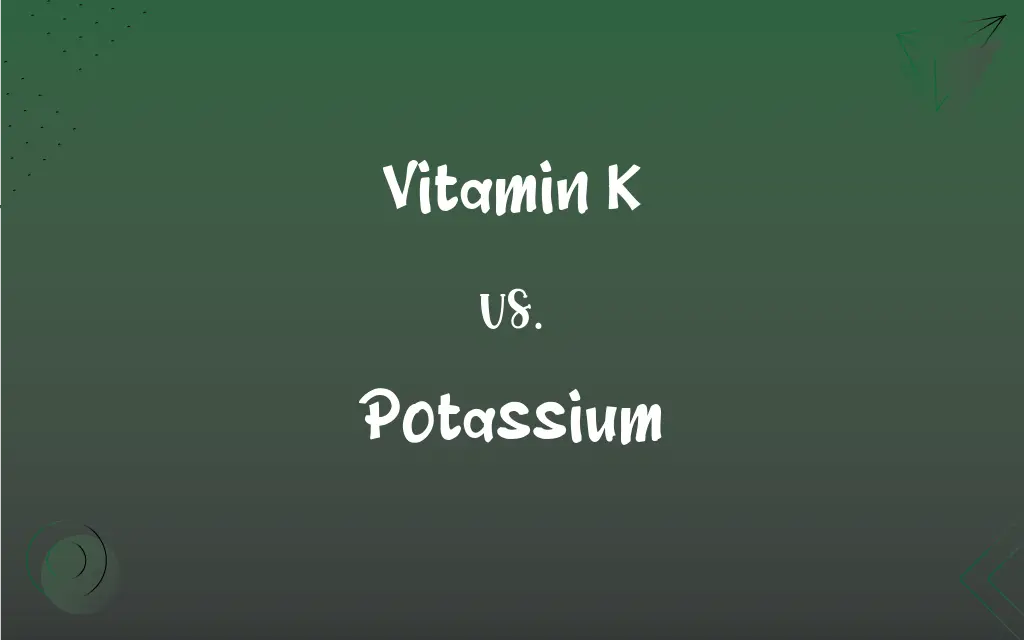Vitamin K vs. Potassium: What's the Difference?
Edited by Aimie Carlson || By Harlon Moss || Published on January 17, 2024
Vitamin K is a fat-soluble vitamin essential for blood clotting and bone health, while potassium is an electrolyte vital for nerve function and muscle contraction.

Key Differences
Vitamin K is a group of fat-soluble vitamins, crucial for the synthesis of proteins that mediate blood clotting and bone metabolism. Potassium, on the other hand, is a mineral and an electrolyte, playing an essential role in maintaining fluid balance, nerve signals, and muscle contractions.
The main dietary sources of vitamin K include leafy green vegetables, vegetable oils, and some fruits. Potassium is abundant in foods like bananas, potatoes, spinach, and beans, reflecting their differing roles in nutrition.
Deficiency of vitamin K can lead to increased bleeding and impaired bone health. In contrast, a deficiency in potassium manifests as muscle weakness, cramping, and cardiovascular irregularities.
Vitamin K is involved in activating proteins and calcium essential to blood clotting. Potassium is vital for proper functioning of cells, nerves, and muscles, including the heart muscle.
Vitamin K has two main forms: K1 (phylloquinone) found in plants and K2 (menaquinone) produced by intestinal bacteria. Potassium does not have different forms but is crucial in regulating heart rhythm and blood pressure.
ADVERTISEMENT
Comparison Chart
Classification
Fat-soluble vitamin
Mineral and electrolyte
Main Functions
Blood clotting, bone health
Nerve function, muscle contraction
Dietary Sources
Leafy greens, vegetable oils
Bananas, potatoes, spinach, beans
Deficiency Symptoms
Increased bleeding, weak bones
Muscle weakness, heart irregularities
Forms
K1 (phylloquinone), K2 (menaquinone)
Singular form, as an ion
ADVERTISEMENT
Vitamin K and Potassium Definitions
Vitamin K
A fat-soluble vitamin important for blood clotting.
Vitamin K is administered to newborns to prevent bleeding disorders.
Potassium
Found in many fruits, vegetables, and beans.
Bananas are well-known for their high potassium content.
Vitamin K
Found in green leafy vegetables and oils.
Kale and spinach are excellent sources of vitamin K.
Potassium
Regulates fluid balance and muscle contractions.
Athletes ensure adequate potassium intake to prevent cramps.
Vitamin K
Involved in bone metabolism and health.
Adequate vitamin K intake is essential for strong bones.
Potassium
Important for nerve function.
Potassium aids in transmitting nerve signals throughout the body.
Vitamin K
Comes in two forms, K1 and K2.
Vitamin K2 is produced by gut bacteria and also found in fermented foods.
Potassium
An essential mineral and electrolyte.
Potassium is crucial for maintaining normal heart function.
Vitamin K
Essential for activating certain proteins.
Vitamin K activates proteins that play a role in blood clotting.
Potassium
Helps maintain normal blood pressure.
A diet high in potassium can help lower blood pressure.
Potassium
A soft, silver-white, extremely reactive element that is an alkali metal, is essential to plant and animal cell functions, and occurs in nature only in compounds. It can be obtained by electrolysis of its hydroxide and is found in, or converted to, a wide variety of salts used especially in fertilizers and soaps. Atomic number 19; atomic weight 39.098; melting point 63.5°C; boiling point 759°C; specific gravity 0.86; valence 1. See Periodic Table.
Potassium
A soft, waxy, silvery reactive metal that is never found unbound in nature; an element (symbol K) with an atomic number of 19 and atomic weight of 39.0983. The symbol is derived from the Latin kalium.
Potassium
(countable) A single atom of this element.
Potassium
An Alkali element, occurring abundantly but always combined, as in the chloride, sulphate, carbonate, or silicate, in the minerals sylvite, kainite, orthoclase, muscovite, etc. Atomic weight 39.0. Symbol K (Kalium).
Potassium
A light soft silver-white metallic element of the alkali metal group; oxidizes rapidly in air and reacts violently with water; is abundant in nature in combined forms occurring in sea water and in carnallite and kainite and sylvite
FAQs
What foods are high in Vitamin K?
Leafy greens, some fruits, and vegetable oils.
Is Vitamin K fat-soluble or water-soluble?
Vitamin K is fat-soluble.
Are Vitamin K supplements necessary?
Usually not, except in certain health conditions.
What does potassium do in the body?
Regulates nerve function and muscle contractions.
Can you overdose on Vitamin K?
Rare, but possible, especially with supplements.
What are the symptoms of potassium deficiency?
Muscle weakness, cramping, and heart irregularities.
How does Vitamin K affect blood clotting?
It activates proteins necessary for clotting.
What is Vitamin K?
A vitamin important for blood clotting and bone health.
Is potassium good for the heart?
Yes, it's crucial for heart health and rhythm.
Can potassium intake affect blood pressure?
Yes, it can help lower blood pressure.
Can Vitamin K improve bone health?
Yes, it's involved in bone metabolism.
Do newborns need Vitamin K?
Yes, to prevent bleeding disorders.
Does cooking affect potassium content in foods?
Some loss may occur, but many foods retain potassium.
How does potassium benefit athletes?
It prevents muscle cramps and maintains hydration.
What happens with excess potassium intake?
Can lead to hyperkalemia, affecting heart function.
What's the role of potassium in muscle function?
It's vital for muscle contractions and relaxation.
What is the recommended daily intake of potassium?
It varies, but generally around 2,600–3,400 mg for adults.
Does Vitamin K have different forms?
Yes, K1 in plants and K2 produced by gut bacteria.
Is potassium found only in bananas?
No, it's in many foods like spinach, beans, and potatoes.
Can Vitamin K affect medication?
Yes, especially blood thinners like warfarin.
About Author
Written by
Harlon MossHarlon is a seasoned quality moderator and accomplished content writer for Difference Wiki. An alumnus of the prestigious University of California, he earned his degree in Computer Science. Leveraging his academic background, Harlon brings a meticulous and informed perspective to his work, ensuring content accuracy and excellence.
Edited by
Aimie CarlsonAimie Carlson, holding a master's degree in English literature, is a fervent English language enthusiast. She lends her writing talents to Difference Wiki, a prominent website that specializes in comparisons, offering readers insightful analyses that both captivate and inform.







































































